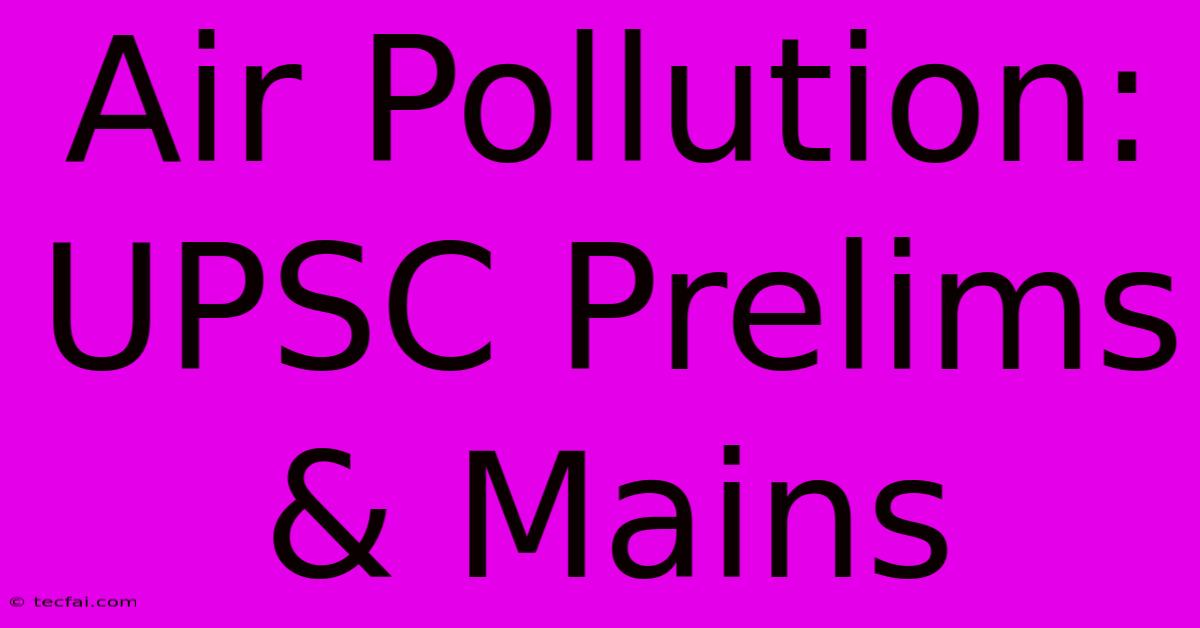Air Pollution: UPSC Prelims & Mains

Discover more detailed and exciting information on our website. Click the link below to start your adventure: Visit Best Website tecfai.com. Don't miss out!
Table of Contents
Air Pollution: UPSC Prelims & Mains – A Comprehensive Guide
Air pollution, a significant environmental challenge with far-reaching consequences, consistently features in the UPSC Civil Services Examination (CSE), both in the Preliminary and Mains stages. This comprehensive guide will equip you with the knowledge necessary to tackle questions related to air pollution effectively. We'll explore its causes, effects, government initiatives, and international collaborations, providing you with a robust understanding for success in the UPSC exam.
UPSC Prelims: Understanding the Basics
The preliminary examination tests your foundational knowledge. Expect questions focusing on:
-
Sources of Air Pollution: Understanding the primary and secondary pollutants is crucial. This includes identifying sources like vehicular emissions, industrial effluents, construction activities, agricultural burning, and natural sources such as volcanic eruptions and dust storms. You should be able to differentiate between these sources and their relative contributions to overall air pollution.
-
Types of Pollutants: Familiarize yourself with common pollutants like Particulate Matter (PM2.5 and PM10), Nitrogen Oxides (NOx), Sulphur Dioxide (SO2), Ozone (O3), Carbon Monoxide (CO), and Volatile Organic Compounds (VOCs). Know their sources and harmful effects.
-
Air Quality Indices (AQI): Understanding the AQI and its different categories (good, moderate, unhealthy, etc.) is essential. Know how the AQI is calculated and its significance in assessing air quality.
-
Major Air Pollution Episodes: Be aware of significant air pollution events in India and globally, such as the Great Smog of London or instances of severe smog in Delhi. Understanding the contributing factors to these events is vital.
-
International Agreements and Protocols: The UPSC often tests awareness of global efforts to combat air pollution. Familiarize yourself with agreements like the Kyoto Protocol and the Paris Agreement, understanding their relevance to air quality.
UPSC Mains: A Deeper Dive
The Mains examination demands a more in-depth analysis and critical evaluation. Here's what you need to focus on:
-
Health Impacts of Air Pollution: Discuss the various health problems caused by air pollution, ranging from respiratory illnesses like asthma and lung cancer to cardiovascular diseases and other health complications. Focus on vulnerable populations such as children, the elderly, and those with pre-existing health conditions.
-
Economic Impacts: Air pollution significantly impacts the economy through reduced productivity, increased healthcare costs, and damage to agriculture and infrastructure. Understanding these economic implications is crucial.
-
Environmental Impacts: Explore the environmental consequences, including acid rain, damage to ecosystems, and the impact on biodiversity.
-
Government Policies and Initiatives: Thoroughly analyze India's policies and programs aimed at reducing air pollution. This includes the National Clean Air Programme (NCAP), various emission standards (Bharat Stage norms), and initiatives promoting cleaner fuels and technologies. Critically evaluate their effectiveness and suggest improvements.
-
Technological Solutions: Understand the role of technology in mitigating air pollution. This includes advancements in emission control technologies, the use of renewable energy sources, and the development of air purification systems.
-
International Collaboration: Discuss the importance of international collaboration in addressing transboundary air pollution. Highlight the role of international organizations and the exchange of best practices.
-
Sustainable Solutions: Explore long-term, sustainable solutions for addressing air pollution. This involves promoting public transport, cycling, walking, urban planning initiatives, and the adoption of sustainable lifestyles.
Preparing for UPSC Success
To excel in the UPSC exam on this topic:
- Regularly read newspapers and magazines: Stay updated on current events related to air pollution.
- Refer to standard textbooks: Consult authoritative sources for a comprehensive understanding.
- Practice answer writing: Regular practice is crucial for developing the ability to articulate your knowledge effectively in the exam.
- Analyze previous years' question papers: This will help you understand the pattern and types of questions asked.
- Develop a holistic perspective: Connect air pollution with other environmental issues and broader socio-economic contexts.
By adopting a structured approach and consistently engaging with the material, you can effectively prepare for questions related to air pollution in the UPSC CSE, increasing your chances of success. Remember that a nuanced and comprehensive understanding, coupled with excellent answer-writing skills, is key to achieving a high score.

Thank you for visiting our website wich cover about Air Pollution: UPSC Prelims & Mains. We hope the information provided has been useful to you. Feel free to contact us if you have any questions or need further assistance. See you next time and dont miss to bookmark.
Featured Posts
-
Watch Outlander Season 7 Part 2 Online
Nov 23, 2024
-
Two Released After Gatwick Airport Detention
Nov 23, 2024
-
Water Fluoridation A Controversial Study
Nov 23, 2024
-
Surprise Gnx Kendrick Lamars New Album
Nov 23, 2024
-
Giants Bench Release Qb Jones
Nov 23, 2024
